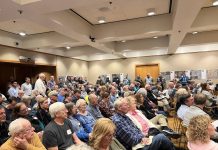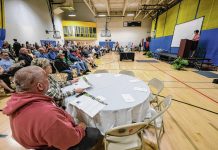Two local women who once used drugs together on Columbus streets have turned their lives around with the help of the WRAP program. Now they are helping other women find their way out of addiction.
Jessica Olson and Leslie Harden, both Women Recovering with a Purpose graduates, are helping organize and coordinate Winners Circle. The group is an aftercare support group for WRAP graduates that meets weekly to help those in recovery stay sober and successfully rejoin the Columbus community.
Olson, 33, and Harden, 40, became close friends in recovery after their stays in the WRAP program overlapped in 2015. They are continuing that friendship in aftercare, re-establishing their lives with their children — each has two — and working full-time.
Both shared that they had found Christ in their journey to recover and said that “God is at the top of both our foundations in recovery.”
[sc:text-divider text-divider-title=”Story continues below gallery” ]
Sometimes Olson defers to Harden in remembering dates of entering the WRAP program and graduation. The two laugh that Harden knows more about Olson’s journey than Olson herself.
“We were in addiction together and now we are in recovery today,” Harden said.
But Olson, who admits that she had been strung out on heroin and other substances before she went into WRAP, is blunt about why that is the case.
“Most of us don’t have our kids when we go in there (to WRAP),” she said. “We abandoned them for drugs. Anything that got in the way of drugs gets abandoned.”
Olson said she has been in trouble with law enforcement with issues since she was 10 years old — and that she had overdosed so many times that she lost count over the years.
Hospital records show it at 18 overdoses, most of the time involving heroin, she said.
“I had a face but no soul to call my own,” Olson said of how she felt at the time. “I wanted to die. That was my goal.”
The lifeline of the WRAP program was thrown to her in 2015 when she was sentenced in Bartholomew County for a drug offense.
Olson said she remembers walking in and thinking, “I don’t like women,” she said. “I saw all these women and thought, ‘Oh no, this isn’t going to work for me.”
She asked if she could leave and was told no.
Harden’s journey to WRAP was different.
She hadn’t been in serious trouble before being arrested in March 2015 for two counts of dealing methamphetamine, behavior that occurred to support her methamphetamine addiction, she said.
Harden had done intensive outpatient treatment and been clean for four years, but she relapsed and returned to her drug of choice, methamphetamine.
“I knew before my court hearing that this wasn’t the life I wanted,” she said.
Describing the charges as a serious wake-up call, it was “go big or go home and I didn’t go home,” Harden said.
She entered WRAP relieved that she was no longer in jail, but uncertain what to expect.
Both women said it took four months in the intensive inpatient WRAP treatment program for them to get a grasp on the depth of their addiction, what it had done to them, their families and relationships. The program focuses on how to change an individual’s decision-making and thought processes to walk away from an addictive lifestyle.
Each woman in WRAP is required to complete a life map, beginning with a woman’s first memory in life through today.
Olson said the life map was one of the most traumatic things she has ever had to do.
“I found out why I didn’t remember parts of my life,” she said. “I had learned to detach from everything.”
When she began the WRAP program, Olson said her default reaction to everything was anger. She described herself then as a “lost little girl.”
“There was a lot of work to be done with me,” Olson said of her initial months in WRAP. “I was angry and defiant. And it took awhile before I learned that anger is a surface emotion that I was using — and I was actually hurt and broken. I learned to separate my emotions and recognize them.”
While doing the life map, Olson said she went on medication for anxiety as emotions were triggered from various life events, and the domino effect came into play. At times, she had to stop because the memories were so overwhelming.
WRAP participants are asked to draw a visual image of something to represent their life on the life map, something to illustrate the journey to being clean from drugs.
“Mine was a brick wall,” Olson said. “I built it and each brick was a memory. And then I had to dig deep to learn the cause and effect of all of it. And everything on there was anger,” she said.
Harden said her life map was nearly as difficult to do as Olson’s, but she did chronicle the death of her father and the death of one of her children, the first time she dealt with that grief while sober.
“It was a freeing feeling. You learn that it’s done and over with and you can deal with it,” Harden said.
Both women completed the year-long program, went through graduation, and have continued to support each other in recovery. Each says there isn’t the urge to use drugs anymore. When times get a little tough, they lean on each other for emotional support and friendship.
Olson now runs two glass repair shops in Columbus while Harden works in production control for a local manufacturer. They have regained custody or visitation with their children, and their oldest daughters are friends, they said.
The most important thing that Olson took away from WRAP was a new way to think and make decisions, which led her away from drug abuse and into more positive responses in her life.
“It’s important to know why I wasn’t able to be successful in being sober on my own. You can’t just take away drugs and everything is fine,” she said. “This (WRAP) is a program about changing your thinking. When you change your thinking, you change your behavior. I’m learning to act on logic instead of emotion.”
Olson says she now knows what her purpose in life is.
“I’m here to produce hope for other people,” she said.
[sc:pullout-title pullout-title=”Overdose statistics” ][sc:pullout-text-begin]
Overdose deaths
Seven people have died in Bartholomew County so far this year from an overdose. This compares to 17 people who died of an overdose by this same time last year.
— Source: Bartholomew County Coroner’s office
Suicide-related/Overdose calls for service
Columbus Police Department has 285 calls so far this year, compared to 359 at this time last year.
Bartholomew County Sheriff Department has 133 calls so far this year, compared to 126 at this time last year.
— Source: Bartholomew County E911 Center
[sc:pullout-text-end][sc:pullout-title pullout-title=”Where to get help” ][sc:pullout-text-begin]
Centerstone
What: Outpatient or partial hospitalization mental health facility
Address: 720 N. Marr Road, Columbus
Offers: Programs for individuals with mental health and substance-abuse disorders
Information: 812-348-7449 or visit https://centerstone.org/
Celebrate Recovery
What: Faith-based 12 Steps and 8 Recovery Principles program to help individuals work through issues with alcohol, drugs, pornography, food addictions, gambling and unhealthy relationships.
9 a.m. Mondays, Community Downtown, 522 Seventh St., coed meeting for adults; 1 hour in length, no child care available.
6:30 to 8 p.m. Tuesdays, Community Church of Columbus, 3850 N. Marr Road, Columbus; two specialized groups for men and women, child care available
6:30 p.m. Tuesdays, Dayspring Church of God Apostolic, 2127 Doctors Park Drive, Columbus. Addiction recovery support group.
11 a.m. Wednesdays, women-only group at Community Downtown, 522 Seventh St., Columbus; no child care available
12:15 p.m. Wednesdays, men-only group at Community Downtown, 522 Seventh St., Columbus; no child care available
11 a.m. Fridays, Community Downtown, 522 Seventh St., Columbus; coed meeting for adults, about one hour, no child care available.
No registration necessary.
Community Downtown information: 812-348-6257 or visit cccolumbus.org/communitychurch/celebrate_recovery
Dayspring information: 812-372-9336 or [email protected]
St. Peter’s Lutheran Church Intensive Outpatient Program
What: Evidence-based 16-week outpatient treatment program for addiction to alcohol, drugs or prescription medication. Includes therapy, recovery, relapse prevention, family education, social support and drug testing, includes group therapy and 12-Step programming. Fees based on ability to pay, has contacts with Community Corrections and county probation department for the Recovery Works program.
Where: 719 Fifth St., Columbus
To learn more: http://stpeterscolumbus.org/ministries/life-works
Note: St. Peter’s also offers Celebrate Recovery sessions from 6 to 7:30 p.m. on Fridays; participants do not need to be a member of the church to attend. For more information, visit stpeters-columbus.org.
Free Indeed Addictions Ministry
What: Faith-based addiction ministry offering support group meetings and programming.
6:30 to 8:30 p.m. Thursdays for food and fellowship in the Who So Ever Will Community Church Fellowship Hall, 623 Eisenhower Drive, Edinburgh
Information: Pastor Lewis Burton, 812-350-7026
[sc:pullout-text-end]




